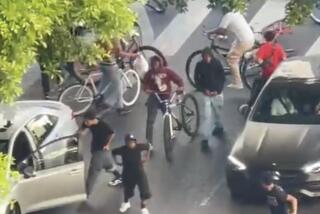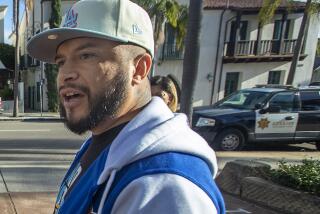Teens Get Jail for Hate-Crime Attack
SAN DIEGO — In an emotional case involving allegations of racism and class prejudice, four Anglo teenagers from an upscale neighborhood were sentenced to jail Friday for an unprovoked hate-crime attack on five elderly Mexican laborers.
The teens, their families and their lawyers had begged for leniency while migrant-rights groups demanded stiff sentences as a warning to others who might prey on migrants.
Superior Court Judge James Milliken handed out sentences ranging from 120 days in a youth camp to 90 days in an adult prison. Four other teens will be sentenced next month.
“The fact that this behavior is possible is a sad commentary on the community,” said Milliken. “I, for one, feel we have to tell the community that we are not going to put up with it.”
Milliken sentenced Morgan Victor Manduley, 17, to 120 days in a youth camp after declaring he was the “least culpable.” Jason Wayne Beever, 16, was given 180 days in a youth camp. Both cried during the hearing.
The alleged ringleaders of the attack--Adam Mitchell Ketsdever, 18, and Bradly Hunter Davidofsky, 17--were sent to state prison for 90 days. After that, Milliken said, he will reevaluate the cases and determine whether they should spend additional time behind bars.
Ketsdever apologized to the victims: “I am truly sorry for what I’ve done and I hope that some day I might make it up to you and your families.”
Beever’s mother sobbed as he was led away in handcuffs. He looked at his mother and mouthed the words “I love you.”
The teenagers, after using a racial epithet to describe their victims, according to several of the targets of the assault, attacked the occupants of a makeshift camp east of Del Mar on July 5, 2000.
That language was the basis for the hate-crime charge.
The victims, in their 60s and 70s, were beaten with clubs and metal rods and shot with a pellet gun as the teens laughed and shouted racial slurs. The victims were robbed of $2 during the attack.
The teenagers swept down on their victims in a car without warning. The victims, all longtime employees of a nursery in Del Mar, lived in a camp hidden in the hills, far from any possible witnesses.
The San Diego Chicano Federation, Latino/Latina Unity Coalition and the California Rural Legal Assistance Foundation had urged Milliken to “send a message to would-be migrant bashers on this stretch of the border.”
Said Luis Natividad of the Latino/Unity Coalition: “We’re satisfied that they didn’t get off.... They should do some time.”
Victim Anastacio Irigoyen, 71, told Milliken through a translator: “I am no longer well. My head is no longer well. They left me for dead. They should be punished as adults.”
Alfred Sanchez, 65, said: “I would like for justice to be done.... I still feel fear, but now we know the law is looking upon them.”
Manduley, the son of a Navy officer deployed to the Arabian Sea, told Milliken that he is trying to make amends for his role in the attack by helping leave water in the desert for immigrants attempting to enter this country.
“I know how much I hurt them,” Manduley said of the victims. “I just want to apologize to them.”
The teenagers faced sentences of up to 12 years in prison after pleading no contest to charges of assault, robbery, elder abuse and committing a hate crime. Their families have settled civil suits brought by the victims for $1.4 million.
The teenagers’ attorneys unsuccessfully challenged Dist. Atty. Paul Pfingst’s decision to try the eight in Superior Court rather than Juvenile Court. A challenge to Proposition 21, the state measure that gives prosecutors greater authority to try juveniles as adults, was rejected in April by the state Supreme Court.
The attack had outraged many in the community. When police were initially unable to determine the identity of the attackers, rewards were offered by the city government, the Chicano Federation and Sempra Energy, corporate parent of San Diego Gas & Electric Co. A reenactment of the crime was shown repeatedly on local television.
More to Read
Sign up for Essential California
The most important California stories and recommendations in your inbox every morning.
You may occasionally receive promotional content from the Los Angeles Times.










